
The Muzikifan "Congo in Kenya" page, with the help of a community of friends and contributors, has grown into a valuable resource for fans of East African music. Therefore I have decided to expand its scope and add the obvious parallel story: Congolese expatriate musicians who ended up in Tanzania. Tanzanian music suffers from the same problems endemic elsewhere in Africa; cassette piracy and lack of equipment and recording facilities. Tanzanian bands ultimately travelled to Nairobi to record there, but there is also the studios of Radio Tanzania which have made many recordings of local bands for airplay. Radio Tanzania Dar Es Salaam (RTD) had bands come in to record 5 songs at a time, once or twice a year, on their one-track system. (In contrast, CBS in Nairobi boasted a 16-track recording deck.) The RTD tapes were used for airplay and helped publicize the band's live performance, but also got stolen or copied and pirated, particularly in neighboring Kenya. In a huge irony, the major pressing plant in East Africa in the 1970s was PolyGram who were a subsidiary of the Dutch Philips group. It was Philips who introduced the cassette tape in 1963. It was small, and more scratch-, dust- and wear-resistant than the LP and could record longer time. But when cassettes took off as a recording medium it signaled the end for the vinyl market in most of Africa.

Due to the huge popularity of Congolese rumba in the 1970s, spearheaded by Franco & O K Jazz, quite a few bands and musicians from Congo made their home in Tanzania over the years, including Tshimanga Assosa, Remmy Ongala, Nguza Viking, Mzee Makassy and Ndala Kasheba. They became huge local stars, and some even achieved international fame.
One bright note is the existence of the Tanzanian Heritage Project which hopes to preserve the surviving tapes in the Radio Tanzania archives.
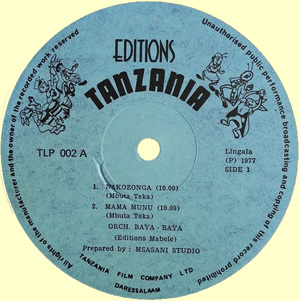
courtesy: Discogs.com
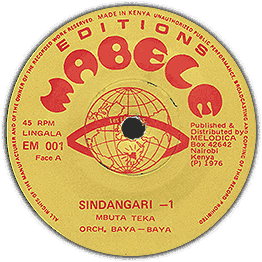
courtesy: afro7.net
Orchestre Baya Baya
Their name came from a hit by Bakolo Keta and Orchestre Kiam, as they were an outgrowth of that band. An obituary on digitalcongo.net mentions Jacques Bazizila, who was guitarist of the band under the stage name of Souza Vangu, and who died 18 July 2012 in Brazzaville. After an apprenticeship with African Fiesta, in 1973 (age 23) he joined Verckys' Orchestre Kiam. After Festival Lagos, 1976, the core of the group split to form L'orchestre Baya Baya. They scored an immediate hit with "Sindangari." (In 1980 Bazizila left to found Les Kamikaze with Youlou Mabiala, Serge Kiambukuta and others.) Some of Baya Baya's singles were issued by the Mabele label in Nairobi, and reissued by the African label in Paris. They may have migrated East, and certainly spent time in Kenya and Tanzania, recording in Swahili. There's a shout-out to Mabele in "Ah, Ndugu!" and Editions Mabele hold the publishing rights to their Tanzanian album, further suggesting it was their own imprint. Their album Nakozonga, recorded at state-run Tanzania Film Company in Dar Es Salaam, came out on the Editions Tanzania label in 1977. Their "Kidogo sana," also recorded in Tanzania, is a contribution to the James Brown/Fela-inspired African funk genre.
LP:
Nakozonga (TLP002) 1977
A1 Nakozonga (Mbuta Teka) 10:00
A2 Mama Munu (Mbuta Teka) 10:00
B1 Nakomi Motu (?) 10:00
B2 Lipopo Souvenir (?) 10:00
45s:
Ah, Ndugu (Mbuta Teka) MBU10, reissued as African 91.148 (1976)
Bulantulu Pts 1 & 2 Eds Mabele MAB 14 (1976)
Bumba 1 & 2 (Ndola wa Dola), MABELE 05, reissued as African 91.069 (1975)
Kidogo Sana (Mbuta Teka) Kwetu (Tanzania) RTRS1068
Lambala 1 & 2, reissued as African 91.070 (1975)
Mama Ndangi Pts 1 & 2 (Malonga Wamona Mpasi) MAB 08 (1975); also ASL 7-2169 (1976); also African 91.085
Mokili ya bato () MBU 11 (re: African 91.xxx)
Mpangi Pts 1 & 2 Eds Mabele, EM 004 (1977)
Nzoto Ya Teka Pts 1 & 2 Eds Mabele, EM 002 (1976)
Sindangari Pts 1 & 2 (Mbuta Teka) Eds Mabele, EM 001 (1976)
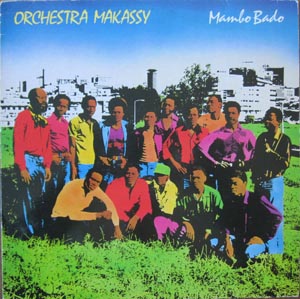
Orchestra Makassy
Orchestra Makassy was led by Kitenzogu "Mzee (elder)" Makassy who came from Kivu in Eastern Zaire. The band was formed in Kampala with Zairean and Ugandan musicians in 1975. They were driven out of Uganda by the regime of Idi Amin and made a life in Tanzania, at first as as a cover band at the New Africa Hotel in Dar es Salaam. In the late 70s Remmy Ongala and Mose Se Fan Fan were both members of this internationally popular group and later covered some of the material in their own bands. In 1982 Virgin released their LP Agwaya to great acclaim.
1982 Personnel:
Vocals: Mzee Makassy / Tshimanga Assosa / Nduka Masingu / Athumani Kindya
Guitar: Aimala Mbutu / Alfani Uvuruge
Bass: Kasongo Shinga
Trumpet solo: Twalib Mohamed
Trumpet: Seye Kadimoke
Alto sax: Akuliake Saleh
Tenor sax: Kayumba Ramadhani
Drum kit: Tubadilako Museki / Yusufu Kalanga
Tumba: Zakwani Kasamby
Notes: Micky Jaga Jaga, whose real name is Tubadilako, played drums on the Agwaya album. Although Remmy Ongala did not participate in the recording of Agwaya, you can see him on the cover. In the group picture he is sitting at the right end. Was Ongala in Kenya at the time? No, he wasn't, the picture is fake. It's an old group photo from Tanzania pasted on a background with the Nairobi skyline.
Although Remmy was not with group anymore, Mzee Makassy picked Ongala's "Mume Wangu" to re-record for the Agwaya album as "Mke Wangu" (both versions are included on the Agwaya CD). And as Fan Fan did not take part in the Agwaya sessions either, two of his songs were also re-recorded without him, "Mosese" and "Molema".
Soon after the recording of Agwaya, Orch. Makassy broke up. This happened when the European tour they were eagerly waiting for did not materialize. Some musicians, including Micky, decided to stay in Kenya. Others, like Mzee Makassy, returned to Tanzania. -- Peter Toll
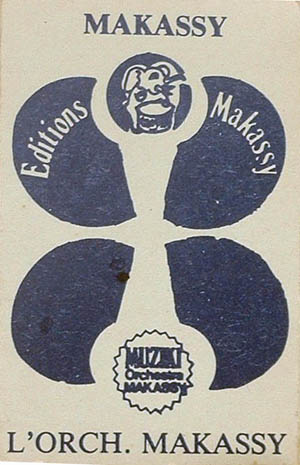
Muziki Orchestra Makassy (ZEMKC 1 1984)
Mosese (Makassy single EMK 02)
Siku Ya Kufa (Makassy single EMK 01)
Athumani (Makassy single EMK 03)
Mume Wangu (Makassy single EMK 04)
The Radio Tanzanian Sessions (Dar es Salaam)
Ciska (Makassy single EMK 07)
Molema (Makassy single EMK 05)
Bakokabolakate (Makassy single EMK 08)
Chama Cha Mapinduzi, a.k.a. "Muungano"
Mosese (Makassy single EMK 02)
Siku Ya Kufa (Makassy single EMK 01)
Athumani (Makassy single EMK 03)
Mume Wangu (Makassy single EMK 04)
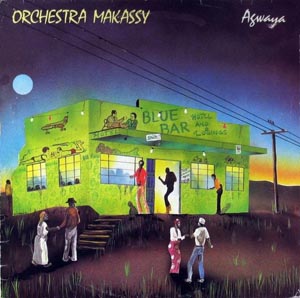
Agwaya (Virgin OVED94, V2236 1982)
Mambo Bado (T. Assosa) 5'26
Zimbabwe 5'00
Kufilisika Sio Kilema 5'08
Nakolela Cherie (K. Makassy) 5'39
Mosese 4'34
Athumani 4'08
Mke Wangu 5'16
Molema 5'28
Makassy prepare for more sales by Chegwe wa Gachamba (Kenya Daily Nation, Saturday June 12, 1982)
The Dar es Salaam-based band Orchestra Makassy left Nairobi on Monday, after recording nearly 20 songs for the local and overseas market.
Earlier on, Makassy's recording had taken a dramatic turn when Virgin Records (UK), after being greatly impressed by the group's music, did an unprecedented thing: In collaboration with AIT (K) Records, they flew in a London producer to record Makassy.
The producer Norman Mighell, is also a resident engineer at Island's Basing St. 24 Track studio. He has produced or engineered several chart toppers and has been instrumental in work on albums by Bob Marley, Toots and the Maytals, Mick Fleetwood and others.
On arrival, Norman halted the recording for the local market which was running into its second week and with the l0ad of recording gadgets he had flown in, set to work on the 16 track CBS studio machines to ensure quality performance.
Doubling as recording engineer and producer, it took him over a week to record tracks for the nine songs destined for overseas markets, leaving the mixing to be done in London. The technical excellence of the recordings -- something unknown in this part of Africa -- has generated quite some activity on the local scene with many musicians wanting Norman to record them.
The overseas repertoire is in Lingala, Swahili and Shona and includes new and old hits: Mossese, Molema, Athumani, Zimbabwe, Cherie, Kufilisika, Mke wangu, Mambo Bado and Ubaya wa Nini. An LP entitled Agwaya (after a Zairean traditional dance) and singles from it will be released by Virgin Records in Europe and possibly the US before the end of the year. Norman optimistically feels that, "Agwaya has the right ingredients and with the growing interest in African music in Europe, it's bound to do reasonably well in the UK and France."
According to Ron Andrews of the AIT Records, "If this expensive experimental project succeeds, record companies may well look to Nairobi as a source of music to spread to international markets."
Due to the unexpected change in the recording schedule, Orch. Makassy's time ran out before they could perform live as promised. But it is understood that they will be back in December to give their fans a treat.
Outside the studio Mzee Makassy was busy checking out the Nairobi music scene. He expressed disappointment at "the lack of authentic Kenyan music and bands despite the many talented musicians." He said: "There's too much copying of Western and Zairean music and poorly at that". He added: "Authentic Kenyan music persistently imposed on people would eventually win public acceptance."
Meanwhile Orchestra Mangelepa plans to visit Tanzania later this month and are scheduled to play in Dar, Tanga, Mwanza, Morogoro, Arusha and Dodoma before the Ramadan period sets in. An extremely popular group in Tanzania, Mangelepa's music is constantly featured on their radio. The Tanzanian crowds are notorious for being very particular about powerful music equipment but the boys are expected to hire the heavy instruments of the National Music Council and Orch. Makassy to administer their Sindano ya Moto effectively.
Notes: Recorded at CBS Studios, Nairobi.
"Mambo Bado" and "Nakolela Cherie" also released as a maxi-single in 1982.
"When Makassy traveled to Nairobi to record Agwaya (1982), the line-up had changed. By that time, Remmy Ongala and Mose Fan Fan had left the group to form Orch. Super Matimila. Before long, however, Fan Fan also moved to Kenya where he signed a record contract with AIT and started his own band, T. P. Somo Somo." - Peter Toll
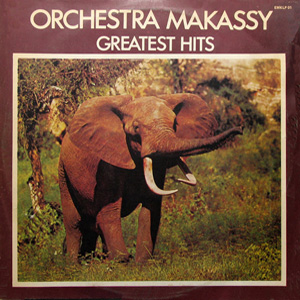
A.1. Molema
A.2. Athumani
B.1. Cisca
B.2. Mosese
Compiled by Felix Jacomo
"Four songs from their first session were issued as singles in East Africa and collected on the Greatest Hits LP. Most of these were updated in the studio and re-recorded for the Agwaya sessions done in Nairobi. The combination of their musicianship and the minimalistic production of Norman Mighell, who recorded them in 1982, produced what many regard one of the finest moments of East African rumba." --Matt Temple
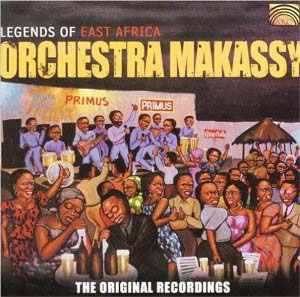
The Nairobi "Agwaya" Sessions, recorded at CBS Nairobi & remixed in London 1982 for Virgin records release Virgin OVED84; reissued on CD on 2005 as Legends of East Africa Orchestra Makassy (ARC Music EUCD1909), with three bonus tracks, "Ubaya wa nini" from the same Nairobi session, and "Muungano" (i.e. "Chama Cha Mapinduzi") & "Mume Wangu" -- tracks previously recorded in Tanzania.
Mambo Bado (Tshimanga Assossa/Kitenzogu Makassy)
Zimbabwe (Kitenzogu Makassy)
Kulifilisika Sio Kilema (Athurani Kindya)
Nakolela Cherie (Kitenzogu Makassy)
Mosese (Mose Fan Fan/Kitenzogu Makassy)
Athumani (Athurani Kindya)
Mke Wangu (Osenga Batty/Kitenzogu Makassy)
Molema (Mose Fan Fan/Kitenzogu Makassy)
Ubaya Wa Nini
Muungano (Mose Fan Fan)
Mume Wangu (Kitenzogu Makassy)
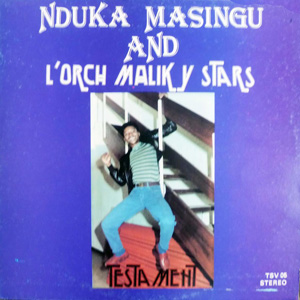
courtesy: Peter Toll
Testament
Maggie
Asha
Mawazo
Note: Nduka Masingu was one of the singers on the Agwaya album. This is an LP he recorded some years later for Polygram.-- Peter Toll
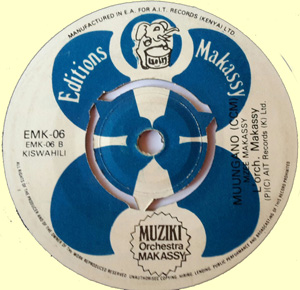
(Thanks to Peter Toll, afro7 net and kentanzavinyl com)
Athumani 1 & 2 (Athumani Kindya) Eds Makassy, Kenya EMK03
Bakoka bolakate 1 & 2 (Mose Fan Fan) Eds Makassy EMK08
Chama Cha Mapinduzi (Mose Se "Fan Fan") 1977
Cisca 1 & 2 (Mose Fan Fan) Eds Makassy EMK07
Maggy 1 & 2 () Eds Makassy EMK011
Mambo Bado 1 & 2 (T. Assosa) Eds Makassy, Kenya EMK09
Mambo Bado b/w Nakolela Cherie Virgin VS 526 1982
Molema 1 & 2 (Mose Fan Fan) Eds Makassy EMK05
Mosese (Fan Fan) Eds Makassy EMK02
Mume Wangu 1 & 2 (Mzee Makassy) Eds Makassy EMK04
Nitakufa bila kisa (Olenba Batty) b/w Muungano CCM (Mzee Makassy) Eds Makassy EMK06
Promotion 1 & 2 Eds Makassy EMK10
Siku ya kufa 1 & 2 (Mzee Makassy) Eds Makassy, Kenya EMK01
Maquis Original
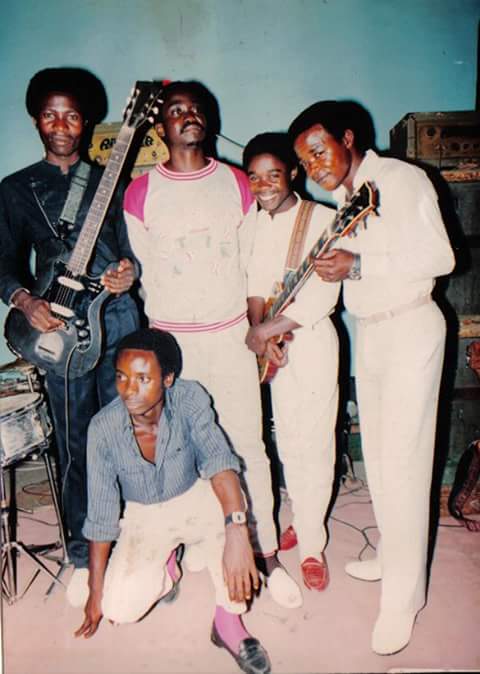
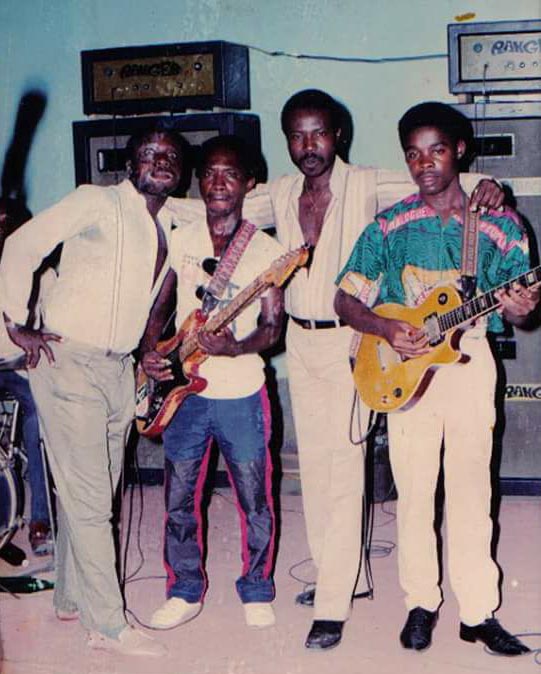
Maquis at RTD studios 1987: William Maselenge (rhythm), Mpoyo Kalenga (trumpet), Dekula Kahanga (solo), Mbuya Makonga Adios (singer); front: Juma Choka (drums). RIGHT SIDE: Mukumbule Parashi, Kocks Mbwana, Samba Wa Mikalayi, Dekula Kahanga
courtesy: Dekula Kahanga
The band originated in Lubumbashi, Shaba province, Eastern Zaire. They came to Tanzania on tour in the 1970s and decided to stay on in Dar Es Salaam. When the government decided to oust foreign bands, later in the 1970s, they enterprisingly set themselves up as a cooperative, OMACO, that owned the White House Club in Ubungu and they bought a farm outside the city that sold its produce in the Kariakoo market. The story of the Maquis is told by Werner Graebner in his liner notes to Tanzanian Dance Bands vol 2 (Monsun records, 1995). Their laid-back style created the notion of "civilized dancing" (i.e. without sweating), preferred by a high-class audience. They started as a splinter from Super Teo band in 1970 (a typical band under contract to a hotel who owned their instruments), when they could afford to buy their own equipment. They were invited to play in Kampala in 1972 and set off on tour but only got as far as Dar Es Salaam, liked it and stayed. In 1985 founder and leader sax-player Chinyama Chianza died and Nguza "Viking" Mbangu took over as leader (his guitar can be heard on "Mpenzi Luta" and "Mabruki") until he decided to go solo in 1987 and later formed Safari Sound.
In the early 80s the band had a string of hits with three LPs produced in Nairobi, but then dropped "du Zaire" from their name and became Maquis Original. at the same time they stopped singing in Lingala and switched to Swahili.
Their visit to Nairobi, to perform and record, was written up in the Kenyan paper in 1982:
Maquis to perform in Kenya by Jeremiah Auram and Amboka Andere
Next month may be a historical one for two major Zairean bands are scheduled to stage a chain of gigs in Kenya. The groups TP OK Jazz of Luambo Luango Makiadi (Franco) and the Tanzania-based orchestra Maquis du Zaire of "Nguza Viking General" are expected in Nairobi on or before December 1. The news about the coming of Maquis was revealed by Mr. Oliver Litondo in a press conference at the CBS studios in Nairobi this week.
Mr Litondo, the organizer of the group's first ever tour of Kenya said the group is billed to do live shows in Nairobi, Nyeri, Kisumu, Mombasa and Nakuru. The tour is scheduled to start on December 1 and will continue until end of December. Mr. Litondo said a special charity show is planned on the eve of the Jamhuri Day at a venue yet to be decided. Part of the money raised from the show shall be donated to charitable organizations, he said.
While the 55-man TP OK Jazz will have no curtain raising group, the Tanzanian based 36-man Maquis will have such a group which has not been named.
And reports from PolyGram and CBS (K) Limited say the two groups will be recorded live during the shows. PolyGram distributes Franco's records while the Maquis records with CBS.
During Franco's private visit here last month he told journalists that he is composing two Lingala/Swahili songs about Kenya and for Maquis, the tour here will also mark the release of its Swahili Christmas number "Nakumbuku enzi." This release is expected to be in the market before Christmas.
-- Daily Nation, 6 November 1982 (courtesy KenTanza Vinyl. com)
Note: both bands had songs in the top 20 that week; on that day the top 20 in Kenya was:
Maze - Tabu Ley
Matatizo Nimeyazoea - Super Wanyika
Jennifer - Wanyika Stars
Salima - Super Mazembe
Mitugo ya agikuyu - Joseph Kamaru
Sikosa langu - Wanyika Stars
Ywak Serfina Odolo - Maurice Jujuma
Baseka - Moja One
Bina na ngai na respect - TPOK Jazz
Pili Mswahili - Baba Gaston (sic)
Ngwenga Odhiera - West Asembo
Maria - Sam Mangwana
Umekwana - Maquis du Zaire
Kele Bibi - Tabu Ley
Kano uparo ang'o - Kawere B Kings
Mwana Mwanyema - Vvia Makale
Eyebana - All Africa Stars
Pauline Awuor - Kawere Kings
Nijana wa Mapendi - Kamaru Sisters
Shemeji - Les Jaca
Leader Tshimanga Assosa left to join Orchestre Makassy and penned their hit "Mambo Bado," but as usual, right on the brink of a breakthrough, the band fell apart, and he returned to Maquis.
The band carried on under singer Mbuya Makonga and Dekula Kahanga (a.k.a. Vumbi). Kahanga started his career in Orch. Bavy National in Kivu, Zaire (DR Congo) in 1983. As Ronnie Graham says, "A lead guitarist with a new sharp sound, Vumbi revitalized the band and put them back on top with their late 80s hit 'Ngalula,' heard on Tanzania Dance Bands vol 2." Subsequent leaders of Maquis include vocalists Tshimanga Assosa and Ilunga Banza. Assosa wrote some of the hit songs of Maquis, such as "Makumbele" and "Ngalula"; those songs also showcased guitarist Dekula Kahanga's talent. Kahanga would later become a successful guitarist on his own; he has now relocated in Sweden. Lead singer Tshimanga Assosa also left for a while in the 70s to return to Kinshasa; back in Tanzania he joined orchestra Makassy and wrote their 1982 international hit "Mambo bado." He returned to Maquis in the mid-80s, leaving again in 1990 to join Legho Stars.
In October 2003 Nguza Viking (Babu Seya) and his son Johnson Nguza were arrested for sex crimes against children. In June 2004 they were sentenced to life imprisonment. The facts of the case suggest they were not given a fair trial, that the prosecution gave inconsistent and uncorroborated evidence. Court documents suggest there was a vendetta against Nguza and his son as two other defendants were released on appeal, and defense witnesses were not heard in the trial. The Nguzas were granted clemency and released by the president in December 2017.
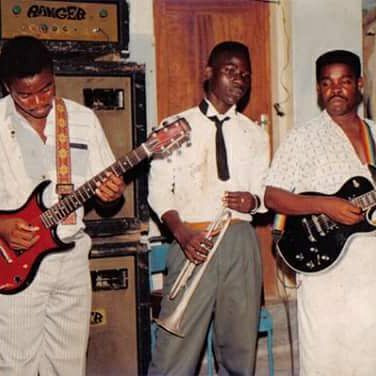
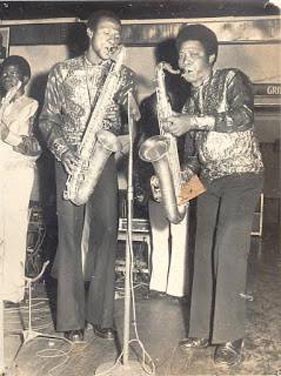
Maquis in 1990 L to R: Burhan Adinan (2nd solo), Toto Ilunga (trumpet), Dekula Kahanga (solo guitar) (courtesy: Dekula Kahanga); RIGHT SIDE: Shunga wa Shinga (bass), Chinyama Chiaza (Chichi) & Chibangu Katay (Paul) tenor saxes (courtesy: Bariki Ngowo)
Personnel:
Vocals: Tshimanga Assosa / Mutombo Lufungala / Mukumbule Lolembo / Issa Nundu / Mbuya Makonga (bandleader) / Kasongo Mpinda / Kasaloo Kyanga / Kiniki Kieto / Kabeya Badu / Kapeya Vivi
Lead Guitars: Nguza Mbangu "Viking" (bandleader) / Ilunga Lubaba / Dekula Kahanga "Vumbi"
Second lead guitar: Mbwana Suleiman / Mulengo Kalonji / Samba wa Mikalai / Nawayi Kabwila
Rhythm guitar: William Maselenge
Bass: Mukumbule Lolengo / Mutombo Sozy / Yusuf Kalanga / Juma Mohamed
Drums: Seif Seid / Sidi Morris
Tumba: Kaaumba Kalemba / Mpoyo Kalenga / Kayembe Ndalambu / Ilunga Ngoie / Kalongo Ngenda / Ngoie Mubenga
Trumpets: Betu Kankonde Abdallah / Salum Nyemba / Tshibangu Katayi / Mafumo Bliali / Hatibu Iteyiteyi
Sax: Mbuya Makonga
Organ: Mguza Mbangu / Tshimanga Assosa
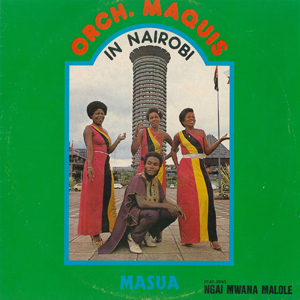
In Nairobi
CBS Kenya EOMLP501 1982
A1-2 Masua (General Nguza Viking)
A3-4 Ngai mwana malole (Kasongo Mpinda "Clayton") also released as a single
B1-2 Bondela Moninga (General Nguza Viking)
B3-4 Maggie (Kikumbi Mpango "Kiki")
Notes:
Originally known as Orchestre Super Gabby, Orchestre Ma Quis Du Zaire was formed in 1963 in a town called Kamina in Zaire's Shaba province. The founding members of the group are: Tshinyama Katay, Tshimbuiza Tshinsense (Nguza Viking), Mbuya Makonga (Adios), Tshibangu Katay, Ilunga Lubaba, Mutombo Lufungula, Mwema Mudjanga and Mwema wa Mwamba. Together they approached a businessman who ran a bar and restaurant and also owned musical instruments and after discussions it was agreed that they perform at the bar.
During the following six years of hard work they acquired enough money to purchase their own musical instruments. In 1971 the band's name was changed to Orchestre Maquis du Zaire and the following year, while on a tour of countries neighbouring Zaire, they decided to settle in Tanzania's capital of Dar es Salaam where they received a wonderful reception from musical lovers. The group now has a large following in Tanzania and through their company OMACO Limited they have purchased property including 154 acres of farmland.
Orchestre Ma Quis Du Zaire's popular music has been exposed through the airwaves on state-owned Radio Tanzania, but until recently not had the chance of being cut on discs to reach fans in neighbouring countries.
The group, which has thirty-six members (twenty eight musicians, three stage show girls and five officials), finally made its first appearance in Nairobi at the beginning of May 1982 for recording sessions at the CBS studio Unfortunately they were unable to give live performances. They did however make some TV appearances.
CBS Records Kenyan Limited is the first record company ever to have signed a recording contract with Orchestre Marquis du Zaire. Following lengthy discussions, including a visit to their office in Dar es Salaam, OMACO's directors were finally convinced and assured CBS records could and would look after the group's interests better than any other record company -- this through the tireless effort of CBS A&R manager F.L. Amaumo.
Special Thanks:
Godfrey Zimba for his unquestionable contribution, Tido Mhando for his company and sparing time until the late hours of the night at the border; Peter Bond for his encouragement during the trying time; Simon Ndesandjo and Peter Musaka for the role played during the session.
Thanks Zaire Embassy Officials, Anthony Kafwihi, John Okeyo, Sammy Oyando, James Kinyanjui, Noah Kamau, Charles Odhiambo of Solace Hotel, Osgood, Immigration and Customer Officials at Namanaga Border. Produced by Livingstone Amaumo, Recorded at CBS Records Kenya Studio Nairobi, Engineer George Fombe, Photographs: Maridadi Studio (front), Joeseph Odiyo (Back). Sleeve design by Avelino Fernandez
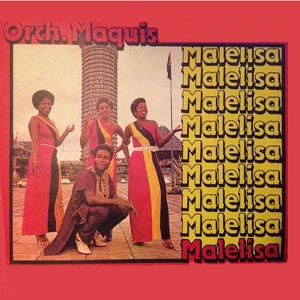
A1 Tokoni kowela mbongo 1 & 2 (also released as a 45)
A2 Mukiwa cherie na ngai 1 & 2
B1 Malelisa 1 & 2
B2 Madilayi 1 & 2
Note: from the cover it appears to be from the same session as the preceding
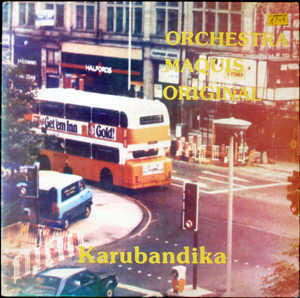

Nguza Viking from back cover of Karubandika
A1 Karubandika (Kasalo Kiyonga)
A2 Mpenzi Lutta (Mutombo Lufungala)
A3 Niwewe Pekee (Field Marshall Nguza Viking)
B1 Sofia (Field Marshall Nguza Viking)
B2 Wakati Nilikuwa Mdogo (Mukumbule Lutembo)
B3 Balimwacha (Kiwiki Kieta)
Notes: Produced by Douglas Paterson for Ahadi.
Also released on cassette as AHD MC 6001, and on CD in 2001
Liner notes:
The Maquis story goes back more than twenty years to the town of Kamina in Zaire's Shaba province.
(But see Stefan's take.) It was in 1963 that the group Orchestre Super Gabby came together and began performing in a local bar. Nearly ten years later, that same band, having changed their name to Orchestra Maquis du Zaire made their first appearance in Dar es Salaam in 1972. It was love at first sight (or sound) as the band received a warm reception from Tanzanian music lovers -- so much so that the band stayed on in Dar making it their home.
Today the thirty-eight member MAQUIS remain one of the dominant groups on the Tanzanian music scene. With the recent success of their smash single "Karubandika", Maquis are rapidly extending their popularity throughout Eastern and Central Africa.
This LP is a selection of some of the most recent Maquis recordings. Get down and enjoy the Zembwela beat! -- F. L. Amaumo
Peter Toll notes it also came out in 2001 as perhaps the final Ahadi CD release with five additional tracks (see below under CDs)
Serieux Ya Mukoko (EOM 70-503 1982)
a1. Mozili Etonda Na Zambo
a2. Zobela Ngai Polela
b1. Serieux Ya Mukoko (also released as a 45)
b2. Na Tango Ya Zala
artwork needed
Cassettes:
Wana Zembwela
(AHD MC003)
Mapenzi ya pesa 1 & 2 6'20
Kazi yangu Baharia 1 & 2 6'49 (missing the end)
(rest on Karubandika LP)
Note: bad sound
Anjelu (AHD MC005) 1985/6
A1 Wema wangu
A2 Anjelu
A3 Double Double
B1 Seya
B2 Mpenzi Luta (M. Lufungula)*
B3 Mabruki (I. Banza)*
(*last two cuts "Mpenzi Luta" & "Mabruki" appear on Tanzania Dance bands vol 2)
"I think Maquis must have recorded Angelu around 1985/86 because Kasongo left Maquis in 1986 (to lead the new MK Group) and also, the solo guitarist on that track sounds like Kasheba who did not join Maquis until 1985 (when his stint with OSS ended)."--Peter Toll

A1 Clara (Kyanga Songa)
A2 Wanaume Waleo (Issa Nundu)
A3 Uba Wangu (Tshimanga Assosa)
B1 Sofia #2 (Nguza Viking)
B2 Mayasa (Ilunga Banza)
B3 Mapenzi sio Masihara (Nguza Viking)
Note: "Sofia #1" was on the Karubandika LP
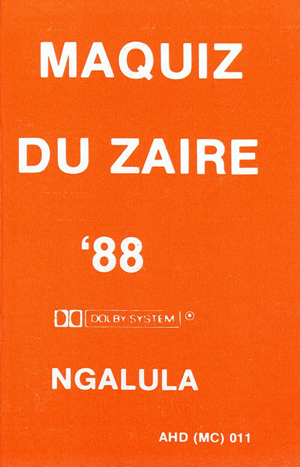
A1 Ngalula (Tshimanga Assosa)
A2 Saleh
A3 Mbiya Tambwe
A4 Sikutegemea mpenzi
B1 Makumbele (Tshimanga Assosa)
B2 Kibulwa
B3 Leah
B4 Nani Atanitetea
Kiongo (Tunazikumbuka Vol 18) (AHD036)
Kiongo (also released as a 45)
Pondamali
Christmas pt 1*
Maiga (also released as a 45)
Zowa (also released as a 45 at 9'01 while this version is 6'37)
Christmas pt 2*
*Notes: muddy sound; the two tracks listed as "Christmas" 1 & 2 were so identified by Nick of Natari who says the cassette identifies them as "Kweli maisha ni safari ndefu" and "Nabweli muziko lya Zambia" which they obviously are not.
Hali Nguma (AHD MC6015) bad sound
A1 Hali Nguma
A2 Marusu
A3 Kisebengo
B1 Mashoga
B2 Ossa
B3 Tipwa Tipwa
.jpg)
A1. Baba Willy
2. Makumbele No. 2
3. Kalenga
B1. Yarabi Nafsi
2. Bonale
3. Kibulwa no. 2
[via Peter Toll]
.jpg)
A1. Mayanga
2. Selina
3. Nenee
B1. Mathy (Matii)
2. Dunia Mzunguko
3. Mpenzi Scolla
[via Peter Toll]
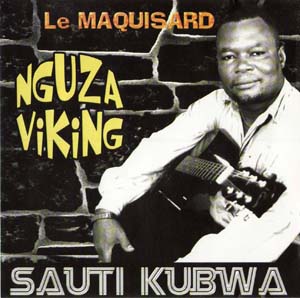
courtesy: Peter Toll
Le Maquisard Nguza Viking
SAUTI KUBWA (GMC)
1. Kadiri ka nsimba
2. Wakati nilikuwa mdogo
3. Karubandika
4. Sofia
5. Ni Wewe Pekee
6. Sumu ya mapanezi
Remakes of some of Viking's hits. Also available digitally here.
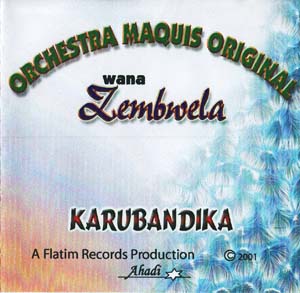
courtesy: Peter Toll
KARUBANDIKA (Ahadi CD1 2001)
1. Karubandika (Kasolo Kyanga)
2. Mpenzi Lutta (Mtombo Lufungula)
3. Niwewe Pekee (Field Marshall Nguza Viking)
4. Sofia (Field Marshall Nguza Viking)
5. Wakati Nilikuwa Mdogo (Makumbule Lulembo)
6. Balimwacha (Kiniki Kieto)
7. Mapenzi ya pesa 1 & 2 (Kasolo Kyanga)
8. Kazi yangu baharia 1 & 2 (Kasongo Mpinda)
9. Nasononeka (Kasongo Mpinda)
10. Wema Wangu (Tshimanga Asosa)
11. Anjelu (Nguza Viking)
Reissue of the Doug Paterson-produced LP from 1986 with added material from Ahadi cassettes MC003 and MC005.
On Compilations (cassette):
Swahili Hits vol 2 (AHD MC004)
Karubandika
Swahili Hits vol 3 (AHD MC004)
Clara
Tanzania Hit Parade 88 (AHD MC6005)
A2 Clara (from Clara)
Tanzania Hit Parade v 2 (AHD MC013)
B2 Saleh (from Ngalula)
Tanzania Hit Parade v 3 (AHD MC014)
B1 Ossa (from Hali Nguma)
Tunazikumbuka Vol 21
A1 and A3; B2; also includes Black Warriors.
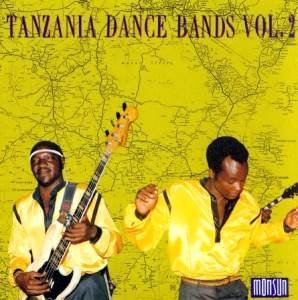
Tanzania Dance Bands vol 2 (Monsun CD MSCD9.01117 0 1991)
1 Ngalula (1988) (K. T. Assosa)
4 Mpenzi Luta (1984) (M. Lufungula)
6 Mabruki (1983) (I. Banza)
8 Makumbele (1987) (K. Kalemba)
10 Nasononeka (1982)* (K. Mpinda)
*Not on the reissued CD from Africassette Muziki wa Dansi (AC9403 1995), due to a perceived mastering problem with the original
Urgent Jumping (Sterns 2016 STCD3067)
Denise (M.M. Adios) 1975
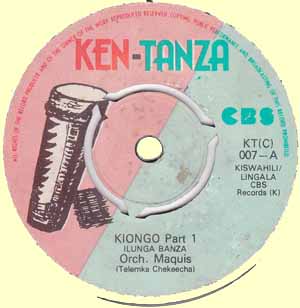
(Thanks to KenTanzavinyl.com)
Bola () b/w Denise (M.M. Adios) Musiki du Zaire MZ14 1975 (B side on Urgent jumping)
Feza mtoto wa Lubumbashi b/w Mobuto Nkoi Mbali () Sindimba SIN 16 1974
Karubandika (Kasalo Kiyonga) Ahadi AHD 05 1985 (also on Ahadi LP6001)
Kasongo () TRS 023 1977
Kiongo (Ilunga Banza) Ken-Tanza CBS KT(C)007 (also on Ahadi 036 cass)
Maiga (General Nguza Viking) Ken-Tanza CBS KT(C)020 1982 (also on Ahadi 036 cass)
Moni Mambo (Ilunga Banza) Ken-Tanza CBS KT(C)052 1982
Mukiwa Cherie na ngai 1 & 2 (Nguza Viking) Eds OMACO EOM 5003 1982 (also on Malelisa LP)
Nakumbaka Enzi (X'mas) (Kikumbi Mpango "Kiki") Ken-Tanza KT (C)048
Ngai mwana malole (Kasongo Mpinda "Clayton") OMACO EOM 5002 1982
Panic Magistrature b/w Kambi el fato () Sindimba SIN 26 1974
Serieux ya mukoko (Kasongo Mpinda "Clayton") Eds OMACO EOM 5004 1982
Subira Suru b/w Kanda ya mbanda (Mbombo K Massaya) Sindimba SIN 25 1974
Tokoni Kowela Mbongo (General Nguza Viking) Eds OMACO EOM 5001 1982
Umekwama (General Nguza Viking) Ken-Tanza CBS KT(C)042 1982
Vero b/w Wa Ng'ole (folklore) Sindimba SIN 15 1974
Zowa 1 & 2 (L. Mukundebo) CBS KT(C)017 (on AHD cass 036)
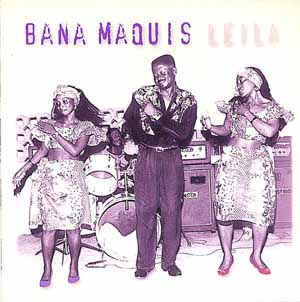
Bana Maquis
CD:
Leila (Dakar Sound DKS009 1996)
In 1994 some of the original members of Maquis teamed up and recorded 6 originals by Assosa in a beautiful, classic album.
1 Leila
2 Bana Maquis (M. Audax)
3 Afrika Amuka (Africa, Wake Up)
4 I Love You
5 Famille Mabe
6 NKana
7 Selemani Maini
Line-up:
Leader, Vocals: Tshimanga Assossa
Lead Guitar: Okende Joseph
Rhythm Guitar: Steven Kaingilila
Trumpet: Kaumba Kalemba, Ngoie Mubenga
Vocals: Issa Nundu, Mutombo "Lufungala" Audax
Bass: Banza Mchafu
Drums: Ayubu Karume
International Orchestra Safari Sound (Ndekule)
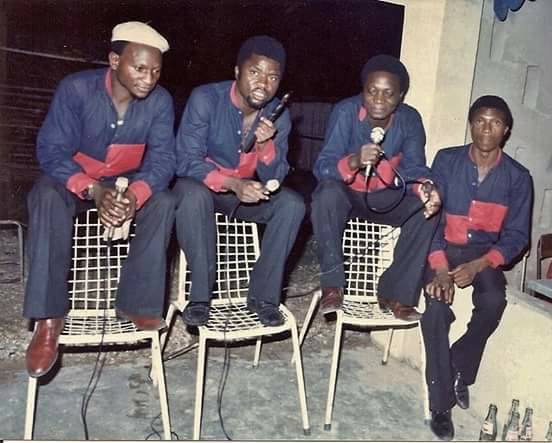
OSS in the 80s. L to R: Gaby Nkomba Kababa, Molay D, Mobali Jumbe & Kabeya Badu
pic courtesy: Dekula Kahanga
A break-away faction of Mlimani Park, Orchestre Safari Sound (OSS) always had a strong contingent of Congolese musicians, according to the liner notes to Zanibara 7, by leading authority Werner Graebner. "Thus in the second part of the 70s the band was led by singer King Kiki and then later in the first half of the 80s by 12 string maestro Ndala Kasheba." A Congolese who played with Fauvette, Safari Nkoi and Orchestra Maquis before forming IOSS, Kasheba left with King Kiki to form Zaita Musica in 1990. He died in 2004. A later version of IOSS was led by Nguza Viking in 1991-2.
Cassettes:
IOSS "Hasiri ya Chunusi" (AHD MSK CAS 502) ca 1988
A1: Wastara
2: Samalenge Utapenda Wangapi
3: Burhan Mlanzi
B1: Hasiri ya Chunusi
Rudi Mpenzi umi
3: Dunia Msongamano (Ndala Kasheba) also on 45
A1 on Swahili Hits vol 2; A3 on Swahili Hits vol 1
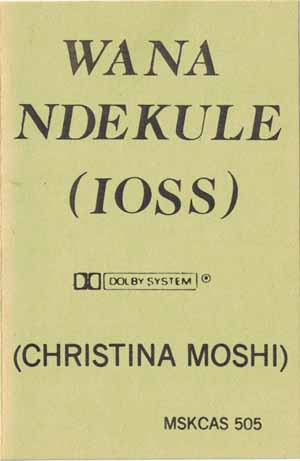
A1: Christina Moshi
2: Fody
3: Homa Imenizidia
B1: Majuto
2: Sosy
3: Usilipuke Kucheka
A1 on Swahili Hits vol 3 and Tanzania Hit Parade; A3 on Tanzania Dance Bands vol 2 and Zanzibara 7; entire B side on Zanzibara 7
IOSS (Duku Duku) "Marashi ya pemba" (AHD/MSK CAS 006)
A1. Marashi ya pemba (Ndala Kasheba)
2. Mwana kwetu
3. Mwaipungu
B1. Gaba
2. Salaam kwa msikilizaji
3. Mpaka manga mbaya (Ndala Kasheba)
A1 on Tanzania Hit Parade; A3 on Tanzania Dance Bands vol 2
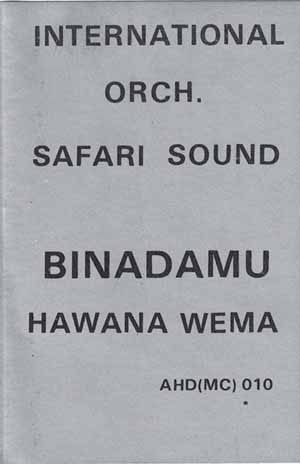
A1. Binadamu hawana wema
2. Siri ya mapenzi
3. Kipipa ayubu
B1. Isiaka
2. Judy
3. Somboko amba
B3 on Tanzania Dance Bands vol 2
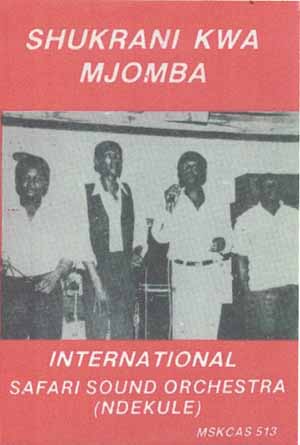
A1. Shukrani kwa Mjomba
2. Shida
3. Pendo
B1. Majuto
2. Kaka Kinyongoli
3. Chatu mkali
B1 repeated from CAS 505; B3 on Tanzania Dance Bands vol 2 and Zanzibara 7
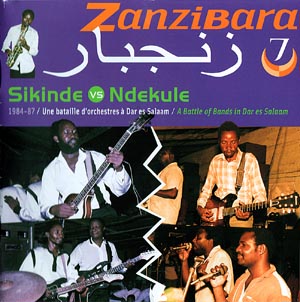
On compilation CD:
Zanzibara 7: Sikinde vs Ndekule (Buda Musique com SC870, 2013)
01 Mtoto Akililia Wembe by Mlimani Park
02 Usilipuke Kucheka (Don't burst out laughing) by IOSS
03 Mume Wangu Jerry by Mlimani Park
04 Sauda by Mlimani Park
05 Chatu Mkali (Beware a snake is dangerous) by IOSS
06 Homa Imenizidia (This fever is becoming too much for me) by IOSS
07 Neema by Mlimani Park
08 Majuto (Regret) by IOSS
09 Chenga ya Mwili by Mlimani Park
10 Sosy by IOSS
11 Conjesta by Mlimani Park
note: Recorded between 1984-7; part of the outstanding series produced by Werner Graebner
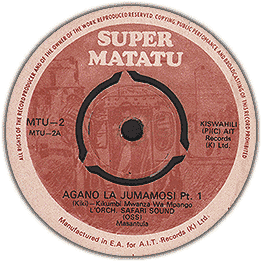
courtesy: Afro7.net
(thanks to Afro7.net)
Agano la Jumamosi 1 & 2 (Kiki Kikumbi) Super Matatu MTU2
Disco Bui Bui b/w Disco Lele Mama Polydor POL591 1985
Dunia Msongamano 1 & 2 Ndala Kasheba (Freddie Supreme) & Orchestra Safari Sound (Dar) Ahadi AHD04
Lala Salama b/w Kenya Safari POL494 1981
Mama Lea Mtoto 1 & 2 Polydor POL563 1984
Mimi Msafiri 1 & 2 (Kiki Kikumbi) Super Matatu MTU5
Manyala (Freddie Kasheba) b/w Kibunga Kimenisonga Polydor POL527 1983
Noel Milele (Ndala Kasheba) b/w Salaamu kwa wote Polydor POL583
Safari Yetu Mbeya 1 & 2 (Kiki Kikumbi) Mutombuku Records MMC 010
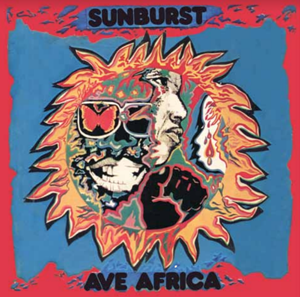
courtesy: Thomas Gesthuizen
Sunburst
CD:
AVE AFRICA (album released in Zambia, 1977, reissued on Strut 2016)
Kitoto Sound
Ukuti Ukuti
Ba Motoka na castle
Kamungulwe
Your day will come
Ani Uni
Wakulu wa kuno
We need each other
Alhamdullilah
Ntambwa
How can I get to you
Ave Africa
The reissue CD also includes these singles as a bonus disc:
45s from Moto Moto (1973):
Black is beautiful
Enzi za Utumwani
Let's live together
Matatizo Nyumbani
45s from TFC (2003-5):
Simba Anguruma
Kipato sina
Vijana
Banchikicha
Mai wetu mai
K.K. of Zambia
1973 Tanzania radio sessions:
Instrumental
Simba Anguruma
Enzi za utumwani
Black is beautiful
Wakulu wa kuno
Get a little older
Kosa langu mpenzi
Personnel:
James Mpungo, vocals
Hembi Kongo, guitar
Bashir Idi Farhan, bass, conga, violin
Kassim Rajabu, vocals, keyboards
Eric Allandale, trombone
Katako Lubula, drums, backing vocals
Kazadi Mbiya, congas, bass, vocals
Sunburst was founded by Hemby Flory Kongo, a Congolese from Mbuji-Mayi, Kasai, who came to Tanzania with Baba Gaston. While in Zambia they picked up two more Congolese members. For years they played as a cover band, the Cobras, at Chez Margot, a dockside dive in the heart of Dar. Sunburst's peak years were between 1973, when they were elected best band of the year, and 1977. In 1977 they broke up, and Kongo joined Safari Sound, playing guitar on hits like '"Msafiri." They are still remembered for their interpretation of a children's song, 'Banchikicha'. The leader, Hembi Kongo, has now found God and plays in a church band in Nairobi. [info from Thomas Gesthuizen]
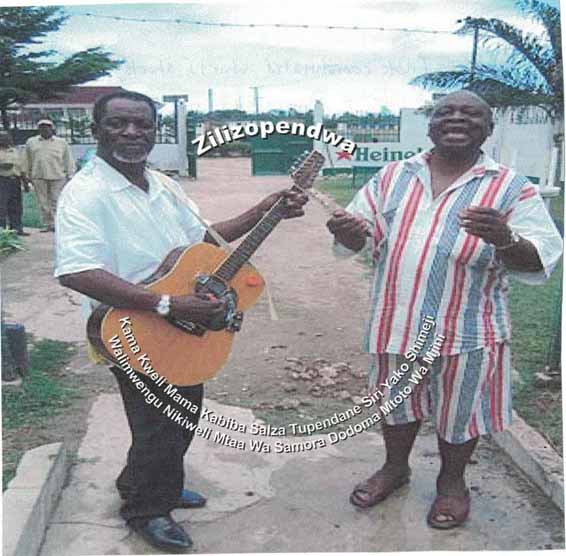
Ndala Kasheba with guitar and King Kiki, photo: Banning Eyre, courtesy Yusuf Wamla
King Kiki
King Kiki Kikumbi Mwanza Mpango was born in Lubumbashi Congo DRC in 1947. In 1961 he joined Novella Jazz Band, then bands such as Gabie Jazz, Vendetta Jazz from 1962 until 1966, and then was in Super Fauvette, Safari Nkoyi, African Fiesta with Dr Nico and Maquis du Zaire.
He left Maquis in July 1979. He met Hugo Kisima who started a new band OSS where it was decided that King Kiki be made bandleader. "I came to Tanzania 40 years ago, I was born in Congo but I have lived here for all my life. My wife is Tanzanian my children were born here so my music is Swahili Rumba, or you can call it Tanzanian rumba."
King Kiki has made name for himself and new band Wazee Sugu due to the fact that till today different music styles have come and gone, but Masantula Ngoma ya Mpwita, Kamanyola or Embalasasa have never left the scene. (Liner notes to Return of Maestro)

Raisi Jakaya. M. Kikwete (13S Planet 006, UK, 2008)
1 Raisi Jakaya M. Kikwete
2 Utamaduni Wa Mtanzania
3 Coco
4 Nusu Ya Pendo
5 Madonna Kasongo
6 Ijue Rita
7 Kitambaa Cheupe
8 Kakakuona
9 Mimi Na Wewe
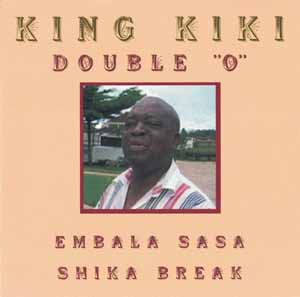
1 Njimina
2 Mtoto kaanza tambaa
3 Mimi nawe
4 Salamule
5 Malalamiko
6 Kibwanange
7 Kinyume
8 Lamanda
9 Dodoma capital
10 Sipendi kugombana
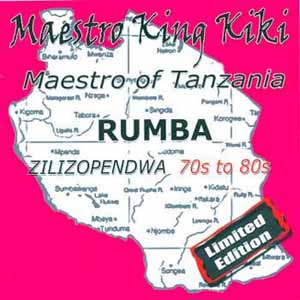
Kama Kweli
Mama Kabibi
Salza
Tupendane
Siri Yako
Shemeji
Walimwengu
Ni Kweli
Mtaa Wa Samora
Dodoma Capital
Mtoto Wa Mjini
Ndala Kasheba
Guitarist and singer Ndala Kasheba first came to Tanzania with Fauvette, a band from Congo in 1964. He was active in the Dar es Salaam scene ever since then. In the 1970s he led the famous Orchestra Safari Sound. He then created his own group Zaita Musica all the while maintaining A list status in Tanzania. Ndala Kasheba passed away in 2004. In Dar es Salaam he is still known as Maestro Supreme. (Limitless sky website)
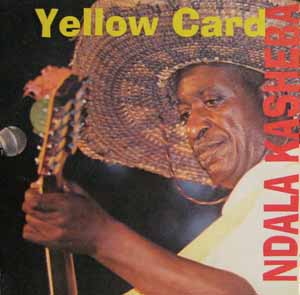
Yellow Card (Limitless Sky Records, US 2002)
1 Kokolay
2 Marinella
3 Kadi Ya Njano
4 Dezo Dezo
5 Marashi Ya Pemba
6 Nimlilie Nani?
7 Mpaka Manga
8 Massamba
9 Sung'ula Weba
10 Umbeya
A reprise of some of his IOSS hits. "Yellow Card was Mzee Kasheba's last album. It contains some of his most famous hits, including "Dezo Dezo," "Marashi ya Pemba" and "Nimlilie Nani." The title track, "Kadi ya Njano" or Yellow Card, is Mzee's scathing commentary on the media and the perception it creates."
Refugees (Limitless Sky Records)
A CD single.
Remmy Ongalla & Super Matimila
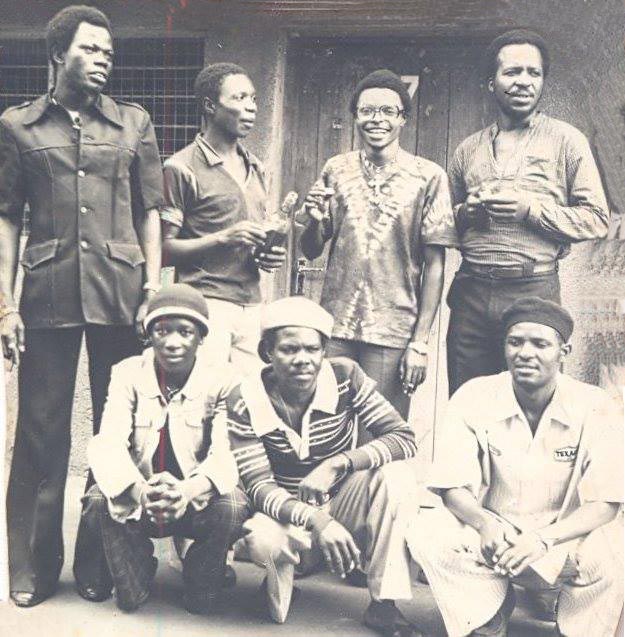
Matimila in 1981. L to R: Dr Remmy, Abuu Semehando, Kasaloo & Fanfan;
Front: Kulwa Milonge, Crizoo Masumbuko & Skass Maliki Kasambula
pic courtesy: Hassan Muhiddin
Originally from Kindu in North-Eastern Zaire, Remmy followed in his father's footsteps, joining his first band at the age of 16. When Matimila was formed in the mid-70s they took their name from the businessman who bought their instruments. From the start their recordings have Ongala's authority stamped on them. The band are in full flight behind his strong lead and his rich sound, reminiscent of OK Jazz, is fully developed. In Super Matimila's music, Congolese rumba has taken its new Tanzanian form, with Swahili lyrics, a more laid-back approach to the rhythm section, and elements of soul (cascading horns) and Caribbean (lilting bass) music, though with the bite of soukous waiting patiently for the seben.
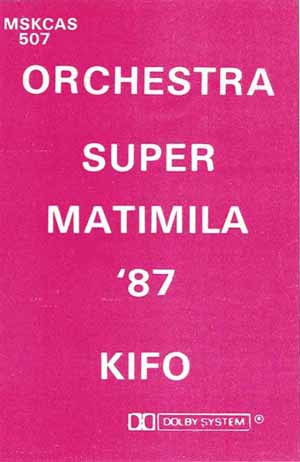
Kifo
(MSK507 1987)
A1: Kifo (also on 45)
2: Mama Mzazi
3: Mwanangu Selina
B1: Narudi Nyumbani
2: Awezae
3: Mandevu
Note: A1 on Songs for the Poor Man; A1 & 2, B1 on Live on stage
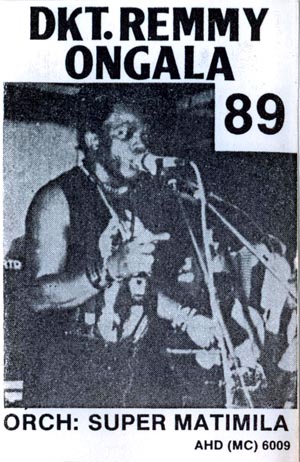
courtesy: worldservice
A1: Nasikitika
2: Hakuna Matapeli
3: Chaguo Lako
B1: Nani Ambembeleze mwenzie
2: Tumetoka Mbali
3: Carola
Note: A1 & B3 collected on Songs for the Poor Man
Harusi (Ahadi AHD6011)
Mariamu
Siri Ya Usingizi
Kipenda Roho
Asili Ya Muziki
Harusi
Pamela
Note: "Mariamu" also released on 45; "Kipenda roho" also on Super Talakaka LP and Songs for the Poor Man; "Asili Ya Muziki" also on On Stage; "Pamela" on Songs for the Poor Man
Niseme nini (Ahadi AHD6019)
Bwana Mdogo
Niseme Nini
Tupendane
Utanikumbuka
Nyumba Za Kupanga
Neema Pt. 2
Note: "Niseme nini" & "Tupendane" also on Mambo
Kilio cha Samaki (Ahadi AHD6027)
Kilio Cha Samaki
Kibon Bo Bombo
Waseme Waseme
Uzazi Wa Mpango
Ujana Maji Ya Moto
Ma'azi Kwa Watoto
Ma'sha Ya Chips Kwa Kuku
"Kilio" (The Fish song) & "Waseme Waseme" on Sema CD
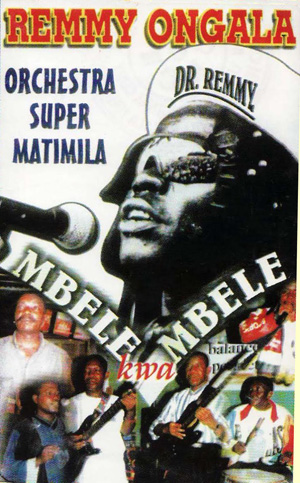
courtesy: Peter Toll
Side A:
Shida
Muziki ya nini
Siri
Walimwengu
Kidogo Chako
Side B:
Mbele kwa mbele
Bwana mdogo
Madakatari
Macho
Distributed by Global Sounds Ltd/Mamu Stores Ltd/Congo Corridor Store
LPs:
Remmy Ongala & Orch. Super Talakaka - Kipenda Roho Hula Nyama Mbichi - Penzi Ni Jahazi (Polydor POLP 538, 1983)
A1: Myone Hana Haki (Remmy Ongala)
A2: Nauliza (Tshibanda)
A3: Vero (Basi Orenga)
A4: Pesa (Remmy Ongala)
B1: Penzi Ni Jahazi (Remmy Ongala)
B2: Dereva (Remmy Ongala)
B3: Kipenda Roho (Tshibanda)
B4: Tabia Nzuri Kwa Watu (Remmy Ongala)
Orch Super Matimila were often called Talakaka, so presumably it is basically the same band. Ongala later said he had no idea this ever came out or who got paid for it. A1 included on Nalilia Mwana; B3 on Songs for the Poor Man
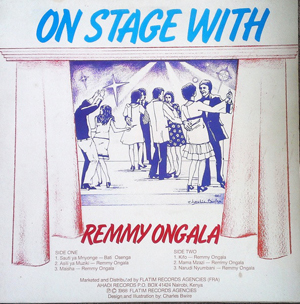
Dance With Remmy Ongala
Stereo LP; cassette
A1: Sauti ya Mnyonge
2: Asili ya Muziki
3: Maisha (also on 45)
B1: Kifo
2: Mama Mzazi
3: Narudi Nyumbani
Note: B side reprised from Kifo cassette
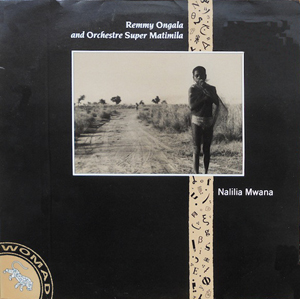
Nalilia Mwana (WOMAD 010 UK 1988)
A1 Nalilia Mwana
A2 Siku Ya Kufa (see note)
A3 Tembea Ujionee (also issued on 45)
B1 Ndumila Kuwili (also issued on 45)
B2 Mnyonge Hana Haki
B3 Arusi Ya Mwanza (see note)
Note: An outstanding album; two of the tracks, "Siku ya kufa" and "Arusi ya mwanza" are actually Orchestre Makassy songs, "Siku ya kufa" (EMK01) and EMK04, which is called "Mume wangu."
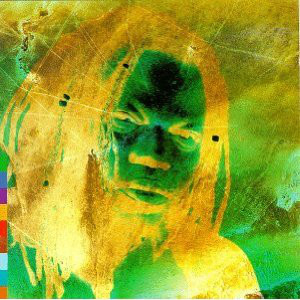
1 Nasikitika
2 Karola
3 Kipenda Roho
4 Sauti Ya Mnyonge
5 Kifo
6 Usingizi
7 Muziki Asili Yake Wapi
8 Pamella
9 Dole
10 Mariam Wangu
Note: Largely reworked from early Makassy material. Tracks 1 & 2 come from Ahadi cassette 6009; track 3 is from the Polydor LP; 4 & 7 come from On Stage; 5 is from the Kifo cassette; 8 was on Harusi cassette; 10 was a single.
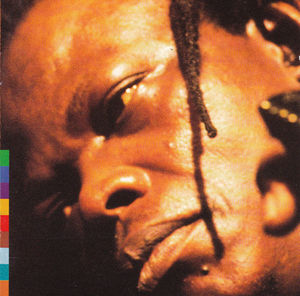
Mambo (Real World Records CDRW22, 1992)
Dodoma
One World
I Want To Go Home
Inchi Vetu (Our Country)
What Can I Say? (Niseme Nini)
No Money, No Life
Living Together (Tupendane)
Mrema
Kidogo Kidogo (Little By Little)
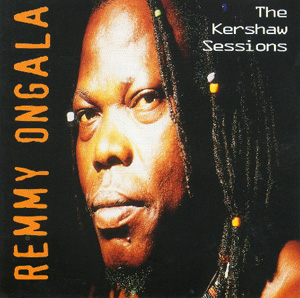
1 Nasikitika
2 Nifanyanini
3 Dole
4 Uzingizi
5 Naruti Nyumbari
6 Bwana Mdogo (Cosmos Chidimule)
7 Niseme Nini
8 Tupendane
9 Kilio
10 Waseme Waseme
11 Maisha
12 Amisa
Published By Womad Music Ltd. & EMI Virgin Music Ltd.
Copyright (c) Strange Roots
Phonographic Copyright (p) BBC Enterprises Ltd.
Credits:
Bass: Muhidini Haji* (tracks: 1-8), Mussa Mangomba* (tracks: 9-12)
Composed by Remmy Ongala (except 6)
Drums: Lawrence Chuki* (tracks: 1-4), Yusuph Subwa* (tracks: 5-12)
Guitar: Batii Osenga Ipopolipo* (tracks: 5-12), Freddy Mwalasha* (tracks: 1-4), Ayas Hassan* (tracks: 1-4 & 9-12), Kawele Mutimanwa (tracks: 9-12), Mjusi Shemboza* (tracks: 5-8)
Percussion: Saidi Jumaina* (tracks: 1-4)
Saxophone: Matu Dikwndia* (tracks: 1-4)
Vocals: Cosmos Chidumule* (tracks: 5-8)
Vocals, Guitar, Backing Vocals: Remmy Ongala (tracks: 1-12)
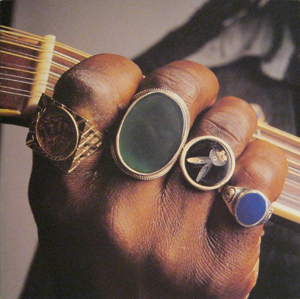
1 Penzi Lauwa
2 Mwanza
3 Waseme Waseme
4 Kilio (The Fish Song)
5 Tamwiki
6 Fadhili Ni Utumwa
7 Mwungo (Naloba)
8 Players
9 Lombamba (Sahala Yayala)
10 Nalia Mwana
11 Libala
Tracks 3, 4, and 10 were previously recorded on cassettes
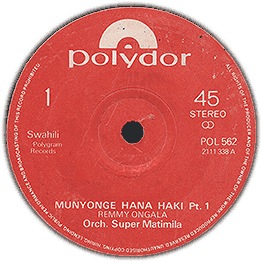
courtesy: Afro7.net
Alimasi (Sykkas Kasambula Kema) Ken-Tanza KT 028
Dunia 1 & 2 Polydor POL 549 1983
Hasira Hasara Jacqueline Pts 1 & 2 Polydor POL528 1983
Kifo Ahadi AHD15 1986
Maisha (Dr Remy) Tanzania Film Co TFCSP2 1985
Mariamu 1 & 2 Polydor POL554 1983-4
Mume Kafichwa Namanga 1 & 2 by Orch Big Tamba Yamba (Les Matimila) Ken-Tanza KT 044
Munyonge Hana Haki Pts 1 & 2 (Remmy Ongala) Polydor POL562 1984
Ndumila Kuwili 1 & 2 (Ramadhan Ongala Remmy) Ken-TanzaKT018 (on Nalilia Mwana) 1981-2
Onyo 1 & 2 (Bath Osenga) Ken-Tanza KT 030
Tembea Ujionee Pts 1 & 2 Ujamaa UJA 02 (on Nalilia Mwana)
Yote Yana Mwisho Pts 1 & 2 (Dr Remmy Ongala & orch. Safari Park) Polydor POL574 1984
Mose Se "Fan Fan"
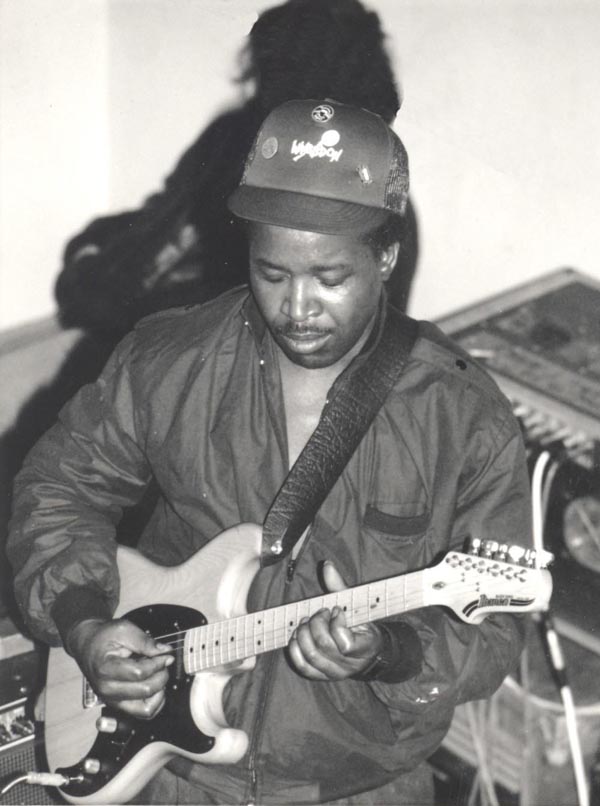
Mose Fan Fan in 1981 (courtesy: Bariki Ngowo)
"Fan Fan" rose to fame in Zaire as co-lead guitar with Franco in OK Jazz in 1967. In 1972 he left the group and played briefly with Lovy du Zaire and Orchestre Mi before forming Somo Somo with whom he issued 17 or more singles. In the late 70s he traveled to Zambia and then arrived in Tanzania where he was backed up by Orchestra Makassy featuring Remmy Ongala. He formed Orchestre Matimila with Ongala before moving to Kenya where he founded Orchestre Somo Somo. After Franco's death he reformed with some former colleagues from OK Jazz.
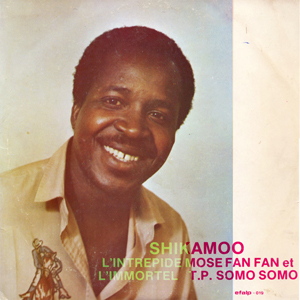
L'Intrepide Mose Fan Fan et L'Immortel T.P. Somo Somo
Shikamoo (Editions FrancAfrique/EFALP 019)
(Recorded in Nairobi as Somo Somo)
A1 Shikamoo
A2 Kimoze-Moze
B1 Maisha
B2 Mbongo (L'Argent Appelle L'Argent)
Record Company: A.I.T. Records
Credits:
Guitar, Lead Vocals, arranged & mixed by Mose Fan Fan
Organ: Francis Njoroge
Bass Guitar: Charles Muthemba
Congas, Backing Vocals: Sammy Kasule
Drums: Shaban Onyango
Rhythm Guitar: Ali Magombeni
Saxophone, Backing Vocals: George Kalombo, Lobe Mapako
Producer, mixed by Felix Jakomo
Recorded & mixed by Steve Ndesandjo
Note: An unrelated band called Shikamoo Jazz was formed of veterans of the Tanzanian scene in Dar in 1993.
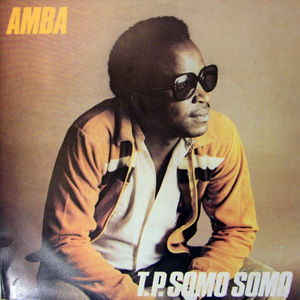
courtesy: Peter Toll
A1: Jolema-Jo
A2: Amba
B1: T.P. Somo Somo
B2:Kamambele
All songs composed by Mose Fan Fan; produced by Felix Jacomo; "Amba" and "T. P. Somo Somo" included on Retro 7CD.

A1 Kizolele 8:04
A2 Kwele 7:50
B1 Kilema 7:45
B3 Poleni 7:14
Musicians:
Bass Guitar: Herman Asafo-Agyei
Congas, Percussion: Armando Mwanda
Drums: Abro Ramazani
Guitar [Mi-solo]: Maika Munan
Lead Guitar: Mose Se Sengo "Fan Fan"
Rhythm Guitar: Edi Mabungou
Saxophone: Jimmy Mvondo Mvele
Trombone: Yorri
Trumpet: Fredo Tete
Vocals: Habiba Batantu, Jean Papy
Written and arranged by Mose Se Sengo "Fan Fan"
Note: Recorded in Paris with top session musicians, reissued by Stern's in London, but included here because the last track "Poleni" was first cut in Nairobi and issued on 45 as Ahadi11.
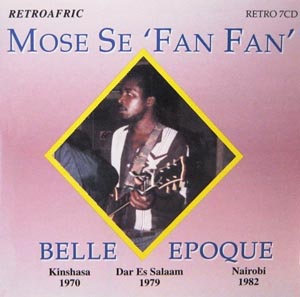
Belle Epoque (Retro 7CD)
Julie La Petite
Serge
Ciska
Molema
Venus
Chama Cha Mapinduzi
Pele Odidja
Amba
Jolie Africa
Suki Pembe Somo Somo
Notes: tracks 1 & 2 are from the OK Jazz period. 3-6 were recorded with Makassy in Dar es Salaam in 1979, although "Venus" was originally titled "Bakoka Bolakate." "Chama Cha Mapinduzi" uses words from president Julius Nyrere. Tracks 7, 8, and 10 were recorded in Nairobi under the Somo Somo name.
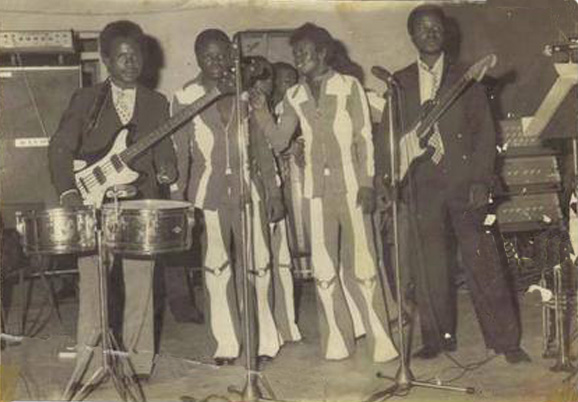
Somo Somo on Stage in Zaire, 1973. bass: Celi Bitshou; singers: Youlou, Diatho; guitar Mose Fan Fan; sax: Empompo

courtesy: Peter Toll
(Note: I have not included singles issued on the Ngadiadia label, of which there were a dozen issued in 1975 and 1976. These were reissued on Sono's African label in the 91.xxx series. Below are listed the East African recordings only. Peter Toll points out the East Africa recordings bear the credit "TP Somo Somo" as opposed to the other versions of the band in Zaire which were only called Somo Somo.)
Amba 1 & 2 Eds Franc-Afrique EFA 03 1982
Fifi 1 & 2 Eds Franc-Afrique EFA 029
Kamambele Eds Franc-Afrique EFA 05
Kimoze-moze Eds Franc-Afrique EFA 015
Mbongo (L'argent appèle l'argent) Eds Franc-Afrique EFA 013
Polele b/w Pole-Pole-Confiance Pathé PEA92
Poleni 1 & 2 Ahadi AHD11
Teboras 1 & 2 (Mose Fan Fan) Feg Disco FEG2 1983
The Katakien Eds Franc-Afrique EFA 018
Last Update: 1 August 2018